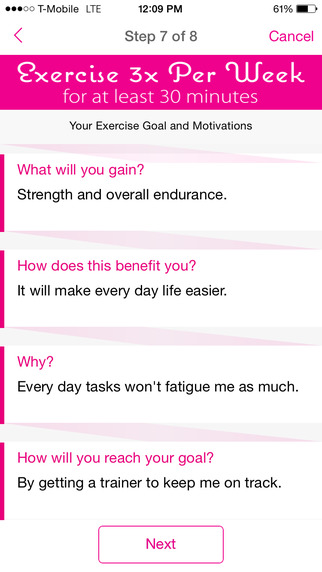 A screenshot from Share the Journey.
A screenshot from Share the Journey.
The Robert Wood Johnson Foundation, a philanthropy dedicated to public health, has always been a big supporter of mobile health projects. Lately, though, it seems like RWJF's funding is going further than ever in the mobile space. Notably, the organization backed two of Apple's premier ResearchKit apps and just gave $468,000 to Partners HealthCare for patient engagement. Here's a round up of just some of the RWJF's recent activities.
Partners HealthCare: Partners just announced that it received a $468,000 grant from RWJF to develop its "Engagement Engine" -- an algorithm that will help users identify and purchase the right fitness tracker for them, and then establish a sustained personal activity plan. Using machine learning, the engine will become better and better at understanding how to best influence behavior. Once the engine is developed, the grant will help fund a study to validate it empirically.
"To build a culture of health we will need tools that help people -- no matter who they are or where they live -- lead healthier lives. Wearable sensors and tracking devices have the potential to help people exercise more, eat healthier and sleep better, and we need to learn more about how people engage with these devices to better understand how they can be maximized,” Deborah Bae, Senior Program Officer at RWJF, said in a statement. “This project will explore ways to use these tools more effectively to increase and sustain physical activity over time.”
ResearchKit: The RWJF backed two of the five initial Apple ResearchKit apps: Share the Journey and mPower. Share the Journey aims to analyze why some breast cancer survivors recover faster than others, why patients’ symptoms vary over time, and what can be done to improve their symptoms. The app will send patients questionnaires and collect sensor data to track five common symptoms of breast cancer treatment: fatigue, mood, cognitive changes, sleep disturbances, and changes in exercise. mPower aims to help Parkinson's disease patients track their symptoms using activities including a memory game, finger tapping, speaking, and walking. The app will also collect data from wearable devices.
QS Access: On a similar note, Quantified Self Labs, a social enterprise led by Ernesto Ramirez that supports the larger Quantified Self movement, received a $600,000 grant from RWJF to "provide support for efforts to improve access to self-collected data, by bringing together stakeholders and producing independent news and research that highlights data access issues." The grant will support two years of meetings where device makers, scientists, and the community can discuss public health use cases for public health as well as a blog channel to keep that conversation going online.
Air Louisville: As we reported earlier this week, the new collaboration between Propeller Health and the city of Louisville to collect data from sensors attached to 2,000 asthma inhalers, which can then be used for public health purposes, was also sponsored by a RWJF grant.
MIT Media Lab: Last fall, the Foundation gave $1 million to the MIT Media Lab for a wellness initiative including two new courses, as well as tools, technologies and initiatives to promote an overall culture of health at MIT. Professor Rosalind Picard is one of the lead investigators on the project.
"Wellbeing is a very hard problem that has yet to be solved by psychologists, psychiatrists, neuroscientists, biologists or other experts in the scientific community,” she said in a statement last fall. “It’s time to bring MIT ingenuity to the challenge.”
Plan Choice Challenge: Recently, the Foundation also sponsored a challenge to create an app that would make it easier for people to evaluate their health insurance choices under the Affordable Care Act. An app called Consumers' Checkbook took first place, followed by Stride Health and Clear Health Analytics.
PatientsLikeMe and Open mHealth: RWJF funds PatientsLikeMe's Open Research Exchange, which lets any researcher access PatientsLikeMe's large data sets and Open mHealth, which is working on creating schemas to standardize mobile health data so apps, devices, and computer systems can communicate with one another more effectively.
On a recent podcast from the Foundation, Susannah Fox, currently an entrepreneur-in-residence at RWJF, spoke about a grant the Foundation once gave to physician Tom Ferguson to write about ePatients. She used the anecdote to talk about the value of making a wide range of investments in digital health ideas.
"What’s really amazing is that that whitepaper and Tom’s vision has taken off and become a worldwide movement where people are starting to engage and stand up for themselves as patients and caregivers," she said. "And I’m not sure that would have come about if the Foundation hadn’t taken a chance on Tom and asked him to write that whitepaper. That’s the sort of thing I think the Foundation should do more of and is doing. It should be constantly looking for the possibility that there’s a small idea that could really gain ground. And I think the coming decade is going to be all about those ideas coming from patients and caregivers."


















